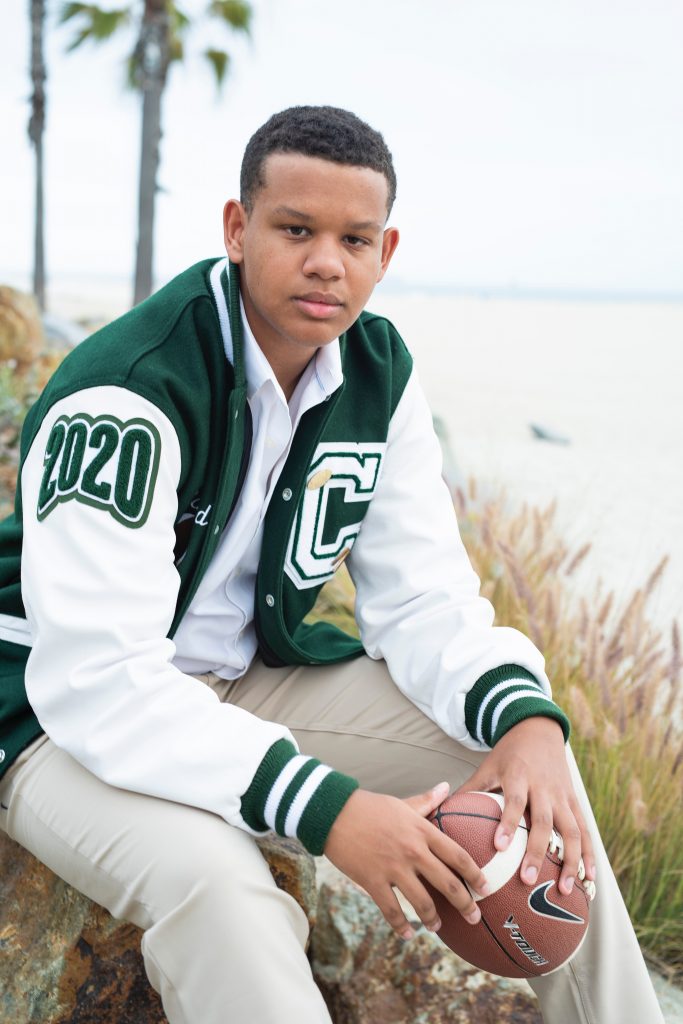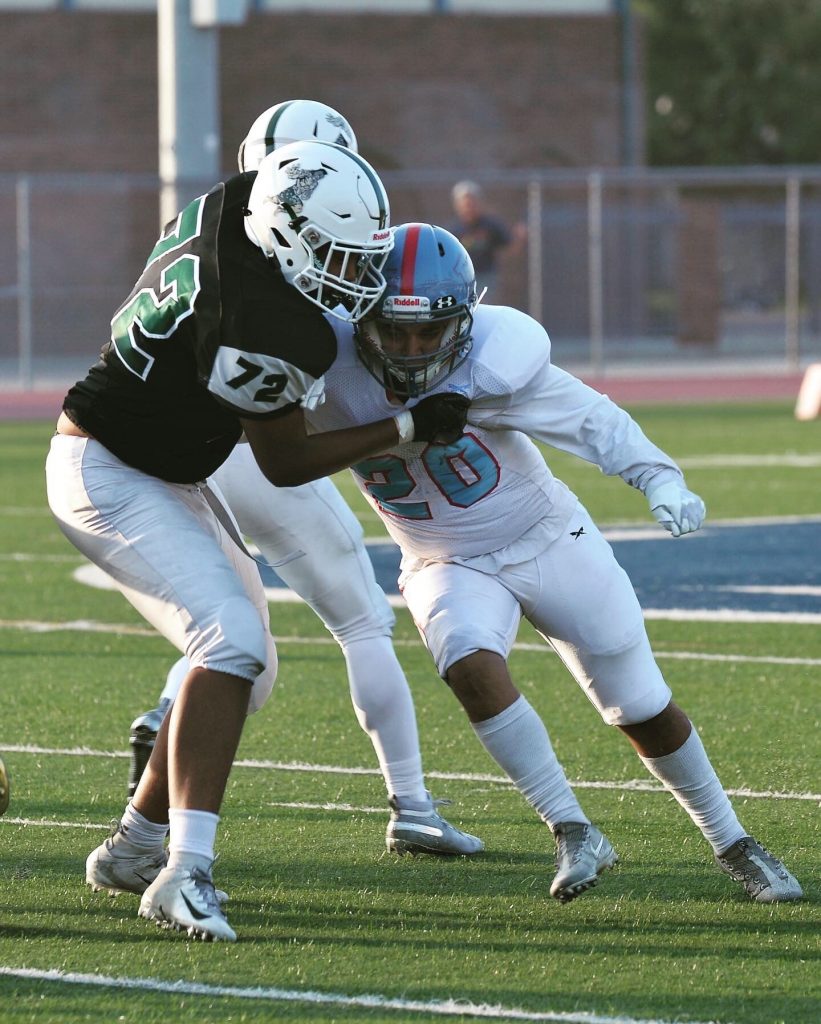Meet Edward. He just graduated with the Coronado High School class of 2020. He’s black.
Edward is a star athlete–the captain of this year’s football team. He’s happiest when he’s playing for a crowd. Although football season on the island is long gone, he still goes out of his way to drive by the football field.
“I love this island,” says Edward. “I love playing for this town. I love seeing all the little kids get super excited near the gate, super hyped. I’m glad I’ve brought them some entertaining games.”

Edward–who will go on to play college football at Morehouse College in Atlanta, Georgia–will always hold Coronado football memories close to his heart. He hopes to be seen as an inspiration and a role model.
A self-admitted “good kid,” Edward never does anything illegal. He’s so good, in fact, his friends tease him for actually following all the traffic laws. (Yes, he makes a complete stop at every single stop sign.)
Why doesn’t he ever take any chances? Why won’t he ever roll through a stop sign? Why is he so serious and stiff during the random times that cops do pull him over?
“Well, when I turned 16, my dad, who lives in Florida, had to teach me some things,” explains Edward. “When you get pulled over, have both of your hands on the steering wheel. Get your license and your registration out, and put them on the dash BEFORE the cop approaches. Don’t move around. Don’t make any sudden movements.”
Edward is afraid of cops. All of them.
“I’m scared of police officers, including Coronado,” says Edward. “I can’t do the same things my friends can do. I can’t hop a fence to a closed playground. If I got caught, I will get thrown to the ground and arrested. It’s a scary time.”
Edward is so concerned, in fact, he takes extra measures to appear to be the good kid that he is, all the way down to the way he dresses.
“I wear my football shirts all the time,” says Edward. “My friends always asked me why, why do I wear my football shirts every day? It’s because if I get stopped by police, or I get pulled over, they will know, hey…he’s on the football team. And most of the police officers here know Coach Hines.”

Edward, who moved to Coronado from Germany as a military kid in middle school, says he was somewhat of a conundrum to his classmates.
“I acted the opposite of what they thought I should be,” says Edward. “I was repeatedly told I wasn’t ‘black enough,’ that I was just white with black skin. It was really demeaning.”
Edward said he almost started believing this stereotype–that he was “white-washed”–until he went to visit the black communities where his father lived, in Florida.
“This made me realize that black people can be so many different things, and you can be whoever you want to be as a black person and still have that identity as an African American,” he says.
Edward says when he first came to school, there were only three other black kids. He said the jokes and racist comments were constant.
“It happened all of the time,” he said. “Sometimes they were small jokes. And sometimes they went over the line.”
Edward admits that most of the time, he was afraid to speak up.
“I thought I had to be quiet,” he said. “I wanted to make a lot of friends. I thought if I say something, they won’t want to be friends with me anymore.”
Edward says his mom raised him right. No fighting: that was the rule. Edward never got in a fight, until one day, he was pushed too far. During his last year in middle school, a student yelled the “N” word behind him. Edward turned around and punched him in the face.
He and the student both got in-school suspension, and had to sit across from each other for a day.
“It was the most uncomfortable experience of my life,” says Edward.
As Edward moved onto high school, things started to shift. Edward started sticking up for himself more, and the racists comments started dying down.
“Initially, I just kind of laughed and went along with everything,” says Edward. “But in high school, I started shutting it down. If it was one of my friends, I would pull them aside and have a conversation. If it wasn’t someone I didn’t know, I would get very mad.”
In spite of the social climate, Edward made a lot of friends, and recalls happy visits to Clayton’s, High Tide, and Night and Day Cafe. He says through high school, most of his friends were white, and he was the “token black friend.”
Edward said he did have one other black friend in his class, and together they would commiserate about their experiences. Although less overt, racism still found its way into the dialogue. It came in the form of racist jokes.
“One of the other jokes was a daddy joke,” says Edward. “People would always say, ‘where’s your dad?’ When I first heard it, I was so mad, and I just wanted to fight everyone. But I got used to it. I can’t fight every single person who says it to me.”
Edward says defending himself and enduring the comments started taking a toll on him.
“I was just sad all of the time my first year of high school,” admits Edward.
He also struggled in the classroom, where sometimes he felt singled out because of his race. Edward felt uncomfortable when topics shifted to the Civil Rights Movement, or when the “N” word was used in literature. Although he calls Coronado teachers “amazing,” he found some of the coursework unnerving.
“When the topic is about African Americans, everyone just turns around to look at you,” he says. “And the teachers always call on you. Also, I remember reading To Kill a Mockingbird, which was one of the most awkward experiences.”
Outside of the classroom and around the island, Edward says he was the subject of frequent racial profiling.
“Yeah, I’ve been harassed,” Edward says. “It’s just something I have to deal with, growing up in Coronado. It happens. I’m 6 foot 3, 210 pounds and I’m black.”
He says he gets followed around in Vons “all of the time,” and it’s obvious enough that other friends notice. Edward has had the cops called on him, while simply walking down Ocean Blvd at night. (He was leaving a beach bonfire and wearing a hoodie, and someone didn’t like how he looked.)
“I’m used to it,” he says. “But I’m a good kid, my parents raised me right. I’ve never stolen anything.”
The murder of George Floyd hit him hard.
“My first reaction was, what if that was me?” says Edward. “And I obviously felt so bad for the family. I thought of his daughter. In the black community, the father/daughter bond is so important. I have three older sisters and all of them love my dad so much. They would be heartbroken if it happened to him.”
Edward says he felt incredibly angry when he watched the video of Floyd’s death.
“I was livid and mad,” he says. “We gotta change it. I don’t want to live this way anymore, of me being terrified of being pulled over. Having a system that’s against me. I don’t want my kids to have this.”
Edward thinks that, when it comes to racism, people are starting to “get it,” but we have a long way to go. He’s excited to see the protests, but wants to know that protesters are down for the long haul.
“It’s good to see people trying to make their voices heard, and make a change,” says Edward. “It’s good to support the movement now, but what we really need is support when all of this dies down. Who’s going to really be supporting the cause a month from now?”
In order to be better allies, Edward says we need to be open to initiating difficult conversations. He offers this advice:
“It just requires more conversation and talking,” says Edward. “In Coronado, I would encourage you to sit down with an African American who has lived here on the island, and just talk to them about their experience. Listen to how our version of America is really different from yours.”
Despite the nationwide climate of civil unrest and racial injustice, Edward says he really wants to give back to his country; he wants to serve in the U.S. Marine Corps.
“That may sound crazy, coming from someone like me,” he says. “But my Dad is a Marine, my sister is becoming a Marine, and I’ve always wanted to serve my country.”
Edward hopes that he will come back to visit Coronado, proud of the man he has become.
“I want to come back and be that kid, I’ve always wanted to be that inspiration,” says Edward. “I may speak well, I may have a different tone of voice, but dammit, I’m black. And I’m proud.”
He hopes that children in the community will look up to him, they way they did when he played for football for Coronado High School.
“I played for all of them,” says Edward. “I played for the middle schoolers. And I played for the little black kids that live here. All of the time. If they see me doing well, they will know that they can do it too.”




